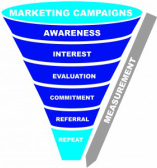
What if assumptions are wrong? By a little? By a lot? These kind of what ifs can create interesting insights. A recent example of testing big assumptions in finance may offer an interesting new perspective for marketing.
It’s not greed…
At the risk of simplifying too much, financial models rely on the widely held assumption that greed drives the market. But one theory submitted by Eric Falkenstein says Why Envy Dominates Greed. While he goes on to build a compelling case in his book one of the clearest arguments is based on evolution and cognitive science. Basically, the social nature of man is built on a capability to monitor relative status, hence envy, rather on the unbounded demands of uncapped needs, or greed. Cognitively, if greed were dominant, we’d likely get mentally swamped in trying to make decisions allocating our resources and energies.And that little assumption can change a lot.
Falkenstein goes on to generate new financial models based on the changed assumption of envy with empirical testing that seems to show how this may be a real improvement to classical financial theory.
It’s not greed…
At the risk of simplifying too much, financial models rely on the widely held assumption that greed drives the market. But one theory submitted by Eric Falkenstein says Why Envy Dominates Greed. While he goes on to build a compelling case in his book one of the clearest arguments is based on evolution and cognitive science. Basically, the social nature of man is built on a capability to monitor relative status, hence envy, rather on the unbounded demands of uncapped needs, or greed. Cognitively, if greed were dominant, we’d likely get mentally swamped in trying to make decisions allocating our resources and energies.And that little assumption can change a lot.
Falkenstein goes on to generate new financial models based on the changed assumption of envy with empirical testing that seems to show how this may be a real improvement to classical financial theory.

Are we making the same assumption in marketing?
Sales and Marketing have long used the model of the “funnel” to structure their efforts. This notion of the funnel has a couple attributes which standout:
If these assumptions are incorrect could it help us rethink how we structure sales and marketing? Beyond greed or envy is there another way to view our ways of connection with the customer? Could this help us rethink the funnel?
More soon!
Sales and Marketing have long used the model of the “funnel” to structure their efforts. This notion of the funnel has a couple attributes which standout:
- It assumes the customer proceeds through the funnel sequentially in a process of satisfying the need for consumption (a.k.a. greed)
- The structure is built from the perspective of the organization’s view and the customer is, well, fodder.
If these assumptions are incorrect could it help us rethink how we structure sales and marketing? Beyond greed or envy is there another way to view our ways of connection with the customer? Could this help us rethink the funnel?
More soon!
 RSS Feed
RSS Feed